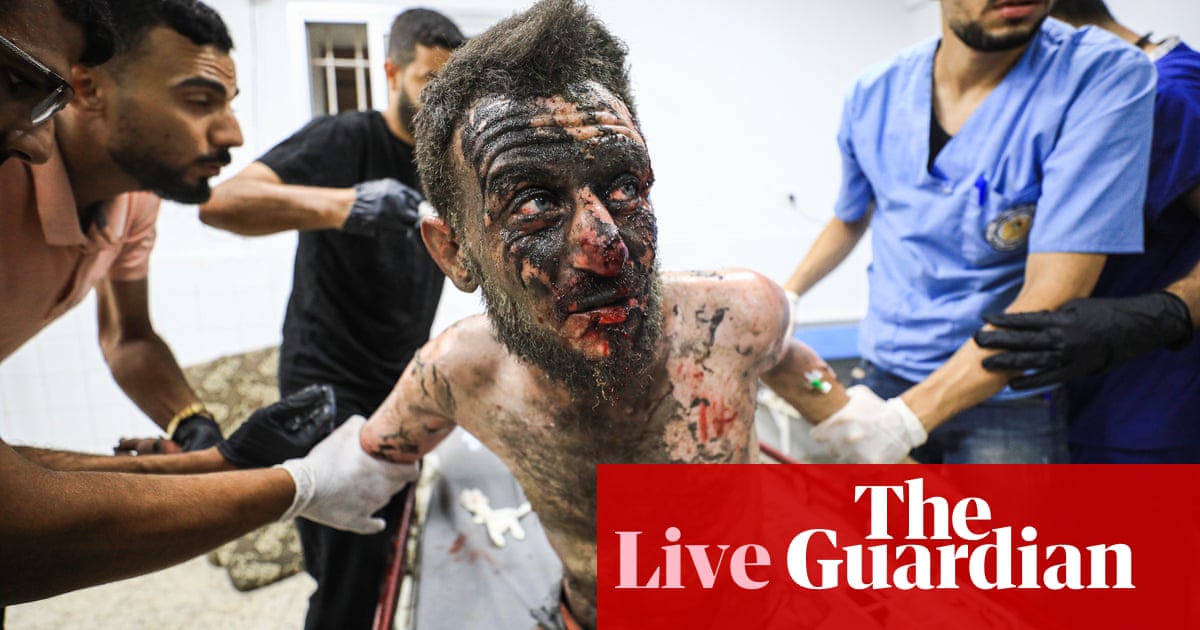Key events
The threat of polio is rising fast in the Gaza Strip, prompting aid groups to call for an urgent pause in the war so they can ramp up vaccinations and head off a full-blown outbreak. One case has been confirmed, others are suspected and the virus was detected in wastewater in six different locations in July.
Polio was eradicated in Gaza 25 years ago, but vaccinations plunged after the war began 10 months ago and the territory has become a breeding ground for the virus, aid groups say. Hundreds of thousands of displaced Palestinians are crowded into tent camps lacking clean water or proper disposal of sewage and garbage.
To avert a widespread outbreak, aid groups are preparing to vaccinate more than 600,000 children in the coming weeks. They say the ambitious vaccination plans are impossible, though, without a pause in the fighting between Israel and Hamas.
“We are anticipating and preparing for the worst-case scenario of a polio outbreak in the coming weeks or month,” Francis Hughes, the Gaza Response Director at CARE International, told The Associated Press.
The death toll following an Israeli stike in the city of Nabatieh city in south Lebanon has risen to 10, according to the country’s state news agency.
Around 10 people were killed, including two children, and five were wounded by the strike on a residential building, state news agency NNA said on Saturday.
The victims were all Syrian citizens, NNA said, adding that a final toll of the strike would be announced after DNA tests were conducted to determine the identity of the victims.
The Israeli military said the airstrike targeted a weapons depot used by Hezbollah militants.

Jason Burke
The latest round of Gaza ceasefire talks have ended in Doha without a breakthrough, but a new date next week has been set for further negotiations to attempt to end the 10-month-old war.
A White House statement signed by the co-mediators Qatar and Egypt described a fresh proposal that built “on areas of agreement” and bridged remaining gaps in a manner that allowed for “a swift implementation of the deal”.
In another statement late on Friday, Joe Biden said the “bridging proposal” offered the basis for a final agreement on a ceasefire and hostage release deal, adding: “With the comprehensive ceasefire and hostage release deal now in sight, no one in the region should take actions to undermine this process.”
Though the two statements struck an optimistic tone, dozens of rounds of indirect talks between Hamas and Israel have failed to achieve a deal since a short-lived truce collapsed in December.
Read more here:
Israeli strike kills 15 from same family, Gaza rescuers say
Gaza’s civil defence agency said an Israeli air strike early Saturday killed 15 people from a Palestinian family, including nine children and three women.
The strike hit the home of the Ajlah family in Al-Zawaida neighbourhood of central Gaza, civil defence spokesman Mahmud Bassal told AFP. The Israeli military did not offer an immediate comment to the agency.
The Melbourne Symphony Orchestra’s policies will undergo an independent review after the decision to cancel a performance by acclaimed pianist Jayson Gillham shortly after he made comments on the killing of journalists in Gaza.
It comes after the orchestra’s musicians passed a vote of no confidence in their senior management on Friday over the cancellation of Gillham’s performance, according to a letter sent by staff to the board seen by Guardian Australia.
Read the full article here:
Israel’s military, on its Telegram channel, said the air force had struck a weapons storage facility of Lebanon’s Hezbollah overnight “in the area of Nabatieh”, which is about 12 kilometres (seven miles) from the nearest point of the Israeli border.
Israeli artillery struck other targets near the border in southern Lebanon, the military said, after air strikes Friday on “Hezbollah military structures” near Hanine and Maroun el-Ras in southern Lebanon.
The killings in quick succession in late July of Fuad Shukr, a top operations chief of Hezbollah in south Lebanon, and Hamas political chief Ismail Haniyeh, led to vows of vengeance from Hezbollah, Iran and other Tehran-backed groups in the region which blamed Israel.
Israel claimed the killing of Shukr, in a strike on south Beirut, but has not commented directly on the killing of Haniyeh while he visited Tehran.
Opening summary
Hello and welcome to the Guardian’s live coverage of the Israel-Gaza war and wider crisis in the Middle East. Here’s an overview of the latest.
The US secretary of state will travel to Israel on Saturday to push for a Gaza ceasefire agreement as the US tries to bridge the gaps in talks for a deal, the state department said, while nine people including children were killed in an Israeli strike on Lebanon, the country’s health ministry said.
Antony Blinken will try to secure a truce and hostage-release agreement through the “bridging proposal” presented by the US on Friday during talks in Doha, the state department said.
President Joe Biden said on Friday that “we are closer than we have ever been” to a ceasefire after two days of talks in the Qatari capital. The talks were paused on Friday with negotiators set to meet again next week.
However, Agence France-Presse reported that Hamas – which did not attend the Doha talks – announced its opposition to what it said were “new conditions” from Israel in the latest plan.
A senior Hamas official, Izzat al-Rishq, told Reuters that Israel “did not abide by what was agreed upon” in earlier talks, citing what mediators had told them.
Blinken and Benjamin Netanyahu, the Israeli prime minister, are expected to meet on Monday, an Israeli official said.
A US official, meanwhile, warned that Iran would face “cataclysmic” consequences and derail momentum towards a Gaza truce if it strikes Israel in response to the killing of Hamas political chief Ismail Haniyeh in Tehran on 31 July.
The US encouraged Iran “not to move down that road because the consequences could be quite cataclysmic, particularly for Iran”, the senior US official said on condition of anonymity in Washington on Friday, amid concerns that Tehran’s threatened counterstrike on Israel could lead to all-out war in the Middle East.
In Lebanon, nine people including a woman and her two children were killed by an Israeli strike on a residential building in the southern city of Nabatieh, the Lebanese health ministry said early on Saturday. Five people were wounded, two critically, it said.
The toll from the strike in the Nabatieh area is one of the largest in southern Lebanon since Hezbollah and Israeli forces began exchanging near-daily fire over their border after war in Gaza began in October.
The Israeli military claimed the airstrike targeted a weapons storage facility used by Hezbollah militants.
Photograph: Chris McGrath/Getty Images
In other developments:
-
Ten Palestinians were killed in an Israeli strike on the town of Zawayda in central Gaza, the official Palestinian news agency Wafa reported on Saturday.
-
Israeli leaders roundly condemned a deadly settler rampage in the Israeli-occupied West Bank, in a rare move. The settler riot in the village of Jit, near the city of Nablus in the northern West Bank, killed one Palestinian and badly injured others late on Thursday, Palestinian health officials said. Benjamin Netanyahu said he took the riots “seriously” and that Israelis who carried out criminal acts would be prosecuted. President Isaac Herzog also condemned the attack, as did the defence minister, Yoav Gallant, who said the settlers had “attacked innocent people”, adding that they did not “represent the values” of settler communities.
-
The office of the UN high commissioner for human rights described the incident as “horrific”, with spokesperson Ravina Shamdasani’s comments echoing widespread condemnation internationally. The EU’s top diplomat, Josep Borrell, said he would propose sanctions against Israeli government “enablers” of Jewish settler violence.
-
The Palestinian foreign ministry said the “armed collective attack” by Israeli settlers on Jit village was “organised state terrorism”.
-
Peace activists from several countries are setting out on a converted trawler to defy an Israeli blockade and deliver humanitarian aid to Palestinians in the Gaza Strip. “The purpose of this mission is to send a message that civil society is not OK with what’s happening in Gaza,” said Fellipe Lopes, the Portuguese media coordinator of the Freedom Flotilla Coalition on board the ship Handala during a stopover in Malta.
-
The UN secretary general has called for parties to the Gaza war to provide concrete assurances guaranteeing humanitarian pauses in order for a polio vaccine campaign to be conducted. António Guterres, speaking at the UN, appealed for assurances to be provided right away as he warned that preventing and containing the spread of polio in the enclave would take a huge, coordinated and urgent effort. He said the UN was poised to launch a polio vaccine campaign in Gaza for children aged 10 but the “challenges are grave”. Gaza’s health ministry declared a polio epidemic in the territory last month, blaming Israel’s ongoing military offensive.
-
The UN special rapporteur on torture has condemned what she called a “particularly gruesome” case of the alleged sexual abuse of a Palestinian prisoner by Israeli soldiers and said the perpetrators of such crimes must be held accountable.
